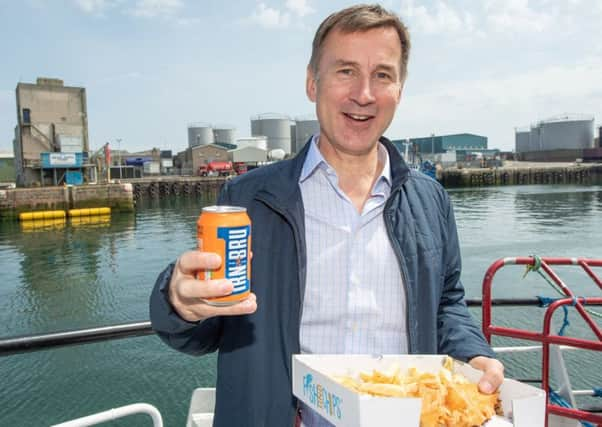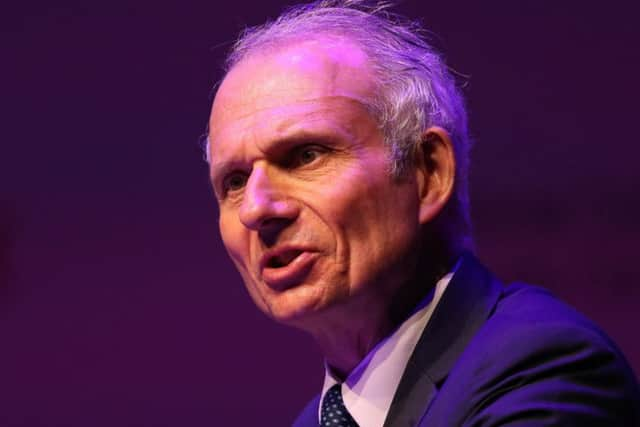Scottish Independence: Deputy PM warns Nicola Sturgeon against fresh campaign


David Lidington, the de facto deputy Prime Minister, will tell an audience in Edinburgh that devolution is a “settled state” and reject Scottish Government claims that relations with Westminster have “broken down” over Brexit.
Ms Sturgeon, who will address the same event, declared yesterday she is “absolutely confident” Scots are ready to vote for independence after a new poll showed support for independence is now neck and neck with remaining in the UK.
Advertisement
Hide AdAdvertisement
Hide AdMeanwhile, Tory leadership contender Jeremy Hunt said on a campaign visit to Scotland yesterday that he would be the prime minister Ms Sturgeon “least wants” because of his commitment to keeping Scotland in the UK.


Scotland’s constitutional situation has again been thrown into sharp focus as a Panelbase poll at the weekend found that the prospect of frontrunner Boris Johnson winning the Tory leadership race would tip support for independence into a narrow majority, as the favourite continues to face awkward questions over his private life.
Mr Lidington, the Cabinet Office Minister, will seek to defend Scotland’s place in the union during a speech to the Law Society of Scotland to celebrate 20 years of devolution.
Ms Sturgeon is seeking to hold a repeat of the 2014 referendum on Scotland leaving the UK late next year, but Mr Lidington will say that devolution goes hand in hand with being in favour of the union.
He will say that in his time as Chancellor of the Duchy of Lancaster, he often hears Scottish Government ministers talk of the broken relationship between the two governments when he claims the truth is that there is a working relationship and there are achievements to point to.
Mr Lidington will say: “The UK government is clear. Our vision for the nations of the United Kingdom is of strong devolved parliaments within a strong United Kingdom. Not as a half-in-half-out compromise. Or something to tolerate reluctantly. Or a temporary stepping stone to a different constitutional future. But as the settled state. Because devolution is not something that sits in opposition to being a unionist.
“Strengthening devolution also requires the UK government to listen and to act. To support devolved governments to evolve and to champion them as the best model for the nations of the UK. That is what we have done throughout our time in government.”
New powers over tax and welfare devolved to Holyrood as part of the post-referendum Smith Commission reforms will be cited by the UK minister. He will add: “While the Scottish Government has a long-standing aspiration to replace that system of strong devolved government within a United Kingdom that acts together in the world, the UK government will champion devolution as the best way to deliver for citizens, and demonstrate how Scotland’s two governments can work together.”
Advertisement
Hide AdAdvertisement
Hide AdScottish Government ministers have claimed that relations between Westminster and Holyrood have “broken down” over Brexit, ministers accusing Westminster of a “power grab” in the responsibilities being returned from Brussels.
But Mr Lidington will add: “I want to challenge some of the assertions that are often made about intergovernmental relations. That they are supposedly at their ‘lowest ebb’. Because in my experience, that is simply not the reality.
“Yes there are very clear differences between us on matters of substance and great importance. But divergent views – however strongly felt – have not prevented us from working together.
“Intergovernmental relations are not defined by fixed moments, or set-piece events. Good relationships don’t begin and end with a meeting in Bute House or Downing Street. It is a culture of joint working and constant dialogue embedded between the governments that continues in the background away from the headlines.”
Legislation which would pave the way for a second independence referendum was published earlier this month and new research suggests it would be too close to call.
A Panelbase survey of 1,024 voters showed that 49 per cent of those questioned support Scottish independence – up one point since last month – while 51 per cent are against it. However, when asked how they would vote if Mr Johnson were to become prime minister, 53 per cent say they would back independence, with 47 per cent against it.
Ms Sturgeon insisted yesterday that Scots are now ready to vote to leave the UK.
“I’m absolutely confident that we would win a referendum,” she told Sophy Ridge On Sunday on Sky News.
Advertisement
Hide AdAdvertisement
Hide Ad“There is no doubt the case for independence is stronger than it has ever been. I’m more confident than I have ever been that Scotland will take that opportunity to be an independent European nation playing our part in the world.”
However, control over the constitution lies with Westminster and the Scottish Government would require the new Tory prime minister to transfer power, through a section 30 order, to enable Holyrood to hold such a vote.
Mr Hunt stepped up the pressure on the issue during a visit to Peterhead yesterday.
“I’m the prime minister Nicola Sturgeon least wants, and for a very simple reason – I believe in the Union with every fibre of my being and I will never allow the Union to be broken up as prime minister,” he said.
“Unlike Nicola Sturgeon, I’m on the side of the Scottish people who say they don’t want another divisive referendum, they want their SNP government to focus on health and education and things that matter to ordinary Scottish families, not things that divide them.
“An independence referendum is not what the people of Scotland want and I listen to the people of Scotland.
“I think it’s time that Nicola Sturgeon did what the people of Scotland want, which is to focus on health and education and all the things she was elected to deliver.”
But SNP deputy leader Keith Brown, who is heading up the revised case for a Yes vote, said the momentum is now with independence.
Advertisement
Hide AdAdvertisement
Hide Ad“Even without the nightmare scenario of Boris Johnson as Prime Minister a referendum would be too close to call – but if he wins, as expected, backing for independence is set to surge,” he said.
“Under any leadership, the Tories support is slumping in Scotland – and after coming fourth in the European election the party is now set to lose seats at both Holyrood and Westminster.
“While we take nothing for granted, it’s no wonder voters are continuing to put their faith in the SNP – the only party with a way out of the Brexit mess and a vision for a better Scotland.”